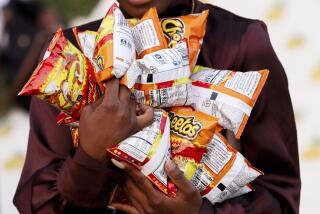Sweetless Fund-Raising
It seems that every week brings new scientific research underscoring the disturbing increase in the numbers of overweight children and the related health disorders they face.
In the last 30 years, childhood obesity rates have doubled. In California, nearly one-third of our young people are overweight. As a society, we cannot afford to ignore this.
While our schools should be doing all they can to create an environment that supports healthy habits, most of them are contributing to the problem in the name of fund-raising. In nutrition classes, students learn about balanced diets and good food choices. Then the lunch bell rings and they walk into a sea of potato chips, chili-cheese fries, soda and candy.
SB 19 sets sensible standards for foods sold at school. Food items with more than 35% of their calories from fat or more than 35% sugar should not be a dietary staple for anyone. Twenty years ago, teenage boys drank more than twice as much milk as soft drinks and girls drank 50% more. By 1996, both boys and girls were drinking twice as much soda as milk. Not only are young people forgoing calcium in favor of empty calories, but by leeching calcium from the bones, carbonated beverages are contributing to an increase in broken bones and osteoporosis.
We know that schools sell these high-fat, high-sugar items and sodas because they create a never-ending cash flow for extracurricular programs. However, with an outpouring of support for this bill, parents, teachers and public health advocates are asking schools to give our young people’s health priority over fund-raising. They are asking that activity directors and teams find more responsible ways of earning money.
There are still scores of kid-friendly food items that could be sold under SB 19. Cookies, pretzels, popcorn, frozen desserts, granola bars, sports drinks and fruit juice-based beverages are just a few examples.
Moreover, it’s time that our schools explore more socially responsible avenues for fund-raising. Corporate sponsorships, community events and club carnivals are just a few ways of breaking schools’ financial dependence on junk food consumption. In my own Senate district, one school earned $8,000 in one day by organizing a jog-a-thon. We may just find that involving parents and communities in fund-raising events like these pays off in ways that a soda and a bag of cheese curls never will.






